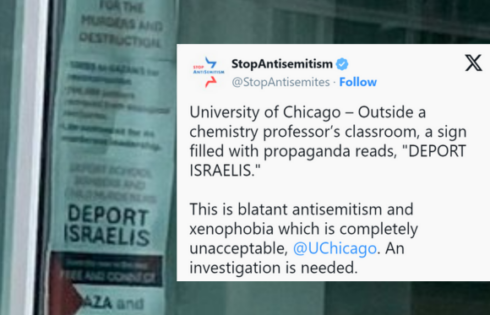
A botched cheating investigation exposes a secret policy
The University of California-San Diego routinely hides the identity of witnesses that could help students accused of wrongdoing exonerate themselves, departing from its own rules on who is “relevant” to an investigation.
This policy, which has been applied against accused students for at least the past five years, was not publicly known until 11 months ago. A state appeals court fleshed out its existence in a due-process lawsuit against the school by a student who was found responsible for cheating and expelled.
That court struck down UCSD’s ruling against Jonathan Dorfman, saying it had no legal reason to withhold the identity of “Student X” – whose test answers Dorfman allegedly copied – from him.
Arguing before the court, the UC System’s own lawyer admitted that the school had never bothered to ask Student X where he was sitting in class that day in 2011 – potentially preempting its case against Dorfman.
It was the second time in just a few months that a California court had found UCSD denied an accused student basic fairness in an adjudication.
Now more than five years after Dorfman was accused, a trial judge will decide Friday whether UCSD can re-try him for a third time, after two proceedings that were thrown out by UCSD’s provosts and a state trial judge.
Statistical analysis is the only evidence
The case against Dorfman boils down to his professor’s suspicion – triggered by the wrong “exam version letter” – that his answers on a chemistry midterm were too similar to those of Student X.
As summarized in the appellate ruling Sept. 16, the professor asked a colleague at a different school what the likelihood was of both tests coincidentally having “eight wrong matching answers,” and was told “a billion to one.”
UCSD relied on this “statistical analysis” as its sole evidence in the first hearing, whose finding against Dorfman was thrown out by the Council of Provosts because Academic Integrity Coordinator Tricia Gallant had helped procure the analysis.
Dorfman v. UCSD ruling – California Court of Appeal, Fourth Appellate Division by The College Fix on Scribd
At the second hearing, Dorfman rebutted his professor by pointing to “40 other instances” of pairs of Scantrons he had found with as many matching answers as his exam and Student X’s. Half of those pairs came from students “who were sitting in different classrooms.”
He was still found responsible for cheating under the “preponderance of evidence” standard, known casually as “more likely than not.”
When Dorfman sued the school, the trial court initially overturned the cheating finding because UCSD had not shown “the matching exams were more than a statistical anomaly,” but later reversed that ruling. The court rejected Dorfman’s claims the hearings were unfair.
‘Minimum procedural requirements’ violated
The school declined to identify Student X to Dorfman because the former was not a “relevant party,” defined under its policies as “one with direct and material understanding of the allegation.”
Going beyond the written definition, however, UCSD said a “relevant party” is also someone who has been charged with wrongdoing – and because Student X was not under suspicion of cheating, it would not tell Dorfman who he was.
The appeals court blasted UCSD for violating its own policies to such an extent that Dorfman’s only way to prove his innocence was unmasking Student X.
MORE: Judge blasts UCSD’s kooky reading of evidence
With no seating chart or any “other safeguards specifically suggested by UCSD” to prevent cheating, all physical evidence of the exam had been thrown out by the time Dorfman was accused by his professor. The school also didn’t interview the proctors who administered the exam.
UCSD’s refusal to identify Student X violated the “minimum procedural requirements” the school promises in writing to students, the court said.
“The discovery of the location of where Student X sat during the exam, or in this case the identity of Student X to seek that information, falls within the evidence contemplated” by the school’s rules for cheating adjudications, and it was “highly relevant.”
Rebutting UCSD’s claim that identifying Student X could open him to retaliation, the court said that because Student X didn’t accuse Dorfman of cheating, “there was no reason” to suspect he’d be threatened.
‘How you get the people in the room is your problem’
The transcript from the Aug. 10, 2015, appeals court hearing shows UC System Senior Counsel Michael Goldstein struggling to convince the judges that UCSD didn’t botch the case from the start.
As Goldstein pointed to the alleged supremacy of the exams with matching wrong answers, Judge Terry O’Rourke blew up:
It would be so easy, wouldn’t it, if we just found out that Student X was on the opposite side of the room? And then you don’t have a case. And it seems to me to be the linchpin of this whole hearing. … It’s almost preposterous in my estimation that we’re sitting around bickering about statistical probability and hearsay and someone calculated this or that. … It’s so simple to find out where the other person was sitting, and you refuse to tell anyone.
An unidentified “female judge” agrees that UCSD’s failure to first investigate Student X’s location during the exam “seems like an enormous omission … in the chain of evidence.”
Hearing transcript of Dorfman v. UCSD – California Court of Appeal, Fourth Appellate Division by The College Fix on Scribd
When Goldstein tries to explain that UCSD wants to “keep this an educational investigative process” and “informal,” a female judge says the determination that Student X wasn’t a “relevant party” is “unfathomable.”
It’s here that Goldstein inserts a new criterion for “relevant party” that is missing from the written definition:
[T]hey determined that a student is relevant if the student is also a charged party so for example, two students are cheating off of one another.
The “female judge” challenges Goldstein, saying “the definition does not say another cheating student.” When she asks how Dorfman could exercise his right to question relevant parties, Goldstein responds “how you get the people in the room is your problem.”
Under rapid-fire questioning, Goldstein concedes that Student X had “extremely relevant” and “potentially dispositive” (conclusive) information. But he says the administration decided that its Scantron evidence was so strong that it did not have to “burden unnecessarily Student X.”
In fact, Goldstein says, UCSD does not “go out and find everyone who may be relevant” to a proceeding, nor does it do other things “that would also have been dispositive.”
To which O’Rourke retorts: “Well, I think there’s a word for that. It’s called stacking the deck.”
When a female judge suggests that UCSD decided “this was enough and we’re not going to give the information to the defense to try to poke holes in it,” Goldstein responds with apparent earnestness: “That is the procedure here.”
Like The College Fix on Facebook / Follow us on Twitter
IMAGE: Shutterstock







Please join the conversation about our stories on Facebook, Twitter, Instagram, Reddit, MeWe, Rumble, Gab, Minds and Gettr.